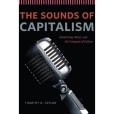《The Sounds of Capitalism》是University Of Chicago Press出版的圖書,作者是Timothy D. Taylor。
基本介紹
- 作者:Timothy D. Taylor
- 出版社:University Of Chicago Press
- 出版時間:2012年7月27日
- 頁數:368 頁
- 定價:50.00 美元
- 裝幀:Hardcover
- ISBN:9780226791159
內容簡介
From the early days of radio through the rise of television after World War II to the present, music has been used more and more often to sell goods and establish brand identities. And since at least the 1920s, songs originally written for commercials have become popular songs, and songs written for a popular audience have become irrevocably associated with specific brands and ...(展開全部) From the early days of radio through the rise of television after World War II to the present, music has been used more and more often to sell goods and establish brand identities. And since at least the 1920s, songs originally written for commercials have become popular songs, and songs written for a popular audience have become irrevocably associated with specific brands and products. Today, musicians move flexibly between the music and advertising worlds, while the line between commercial messages and popular music has become increasingly blurred. "The Sounds of Capitalism" is the untold story of this infectious part of our musical culture. Here, Timothy D. Taylor tracks the use of music in American advertising for nearly a century, from variety shows like "The Clicquot Club Eskimos" to the rise of the jingle, from the postwar growth of consumerism, to the more complete fusion of popular music and consumption in the 1980s and after. Taylor contends that today there is no longer a meaningful distinction to be made between music in advertising and advertising music. To make his case, he draws on rare archival materials, the extensive trade press, and hours of interviews with musicians ranging from Barry Manilow to unknown but unforgettable jingle singers. "The Sounds of Capitalism" is the first book to truly tell the history of music used in advertising in the United States, and an original contribution to this little-studied part of our cultural history.

